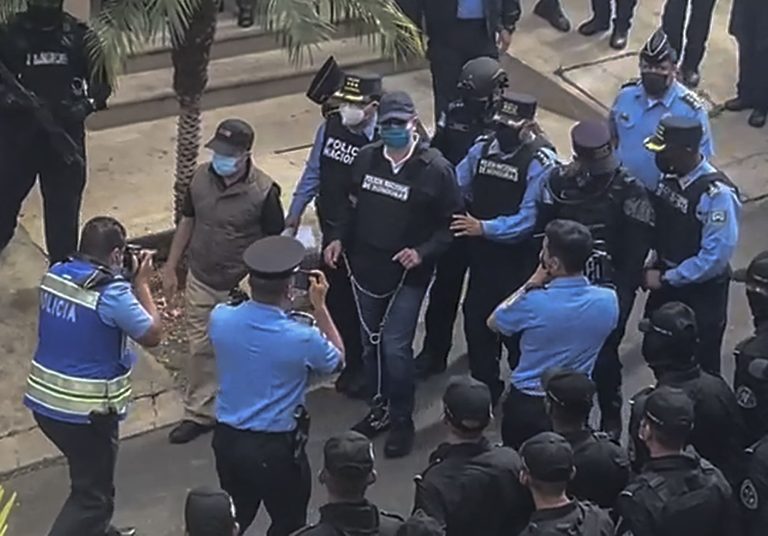20 de febrero 2022

Children of Exile: The Births “Sowing Hope” in the Camp of Nicaraguan Farmers

PUBLICIDAD 1M
PUBLICIDAD 4D
PUBLICIDAD 5D
It will take time to dismantle a gangster state which had the army and the police on its side.

On Tuesday, February 15, the Honduran police detained former president Juan Orlando Hernandez, often referred to simply as JOH. Ramon Sabillon, the police official who presented Hernandez with the arrest warrant, was the same official Hernandez had fired five years ago for arresting without his authorization the Valle brothers who were linked to the Sinaloa drug cartel. Sabillon had just returned from exile, in order to accept his reinstatement as police commander at the behest of newly-inaugurated Honduran president Xiomara Castro.
A New York court has asked for JOH’s extradition, in order to answer charges related to narcotrafficking and the use of heavily armed security to safeguard the drug shipments that passed freely through Honduran territory on their way North. Last year, JOH’s brother, Tony Hernandez, was found guilty in a US court and sentenced to life in prison for the role he played in the drug trafficking arrangement.
Tony wanted to make a name for himself in the drug business, and became a key player thanks to the enormous state power that his close relationship with the President gave him. Among other things, he even marked the cocaine packages with his initials.
During the trial of Tony and other figures involved in the narcotrafficking mafia, JOH’s name came up again and again as a well-known accomplice. The president denied these allegations, and hoped his seat in the powerless Central American Parliament would give him immunity, but his efforts proved of little use.
In ordering the extradition, the US Department of Justice claims to have enough evidence to put Hernandez in prison for several years. Apparently, the magistrates and prosecutors appointed by the former Head of State in the Judicial system couldn’t save him. Honduras is celebrating.
Hernandez was first elected to the presidency in 2014, as the candidate for the National Party. In 2017, he bent the law, using his buddies in the Electoral Tribunal, to continue in power. He won the general elections through a maneuver that the OAS itself questioned as fraudulent. In the 8 years he governed (2014-2022), Honduras hit bottom.
Poverty climbed again. Organized crime and the gangs – deeply tied to the drug business – grew stronger. Under cover of darkness, dozens of activists for land rights, the environment, water and the communities were assassinated or jailed. Even today, six activists against the Guapinol mining remain illegally imprisoned. Two US administrations, one headed by a Democrat, one by a Republican, turned blind eyes. Nonetheless, they couldn’t deal with the resulting hundreds of thousands of Hondurans who arrived at their borders to seek refuge.
On Tuesday, the Honduran newspaper La Prensa published details of the charges awaiting our ex-president in a New York courtroom. There are enough of them to get him off the chessboard for some years. But… there are always the unconditional allies he left behind, and the powerful that he served.
It’s not that Hondurans haven’t fought. They’ve battled hard – in the street, in the media, in the social networks, in the courts, in the international forums. It takes time to dismantle a gangster state that has the Army and the Police on its side.
Now there’s a ray of light. It wouldn’t have been possible without the arrival of Xiomara Castro, who’s been on the job for only two weeks, and without the intelligence of the people who elected her. That vote was a door slammed in the face of the old regime. A reason not to feel faint of heart. What’s in march in Honduras also sends a message to the other JOH’s on the isthmus, who sooner or later must come to understand that arrogant and criminal power isn’t eternal.
* The author is a journalist and writer.
This article was originally published in Spanish in Confidencial and translated by Havana Times
PUBLICIDAD 3M
Escritor y periodista salvadoreño. Su actividad periodística se sitúa principalmente en el diario La Opinión de Los Ángeles, donde ha cubierto migración, educación, economía, transporte, energía y movimiento laboral. Investigó y escribió la crisis inmobiliaria de 2007 y sus secuelas. Es autor de numerosos artículos de opinión. Fue colaborador de la revista Tendencias, de Milenio Diario y Milenio Revista, de México, y columnista de La Prensa Gráfica. Estuvo a cargo de la Dirección de Publicaciones e Impresos entre enero 2012 y abril 2013.
PUBLICIDAD 3D